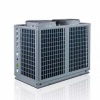sprsunheatpump: How Does A Pool Heater Work?
How Does A Pool Heater Work?
SPRSUN Pool heat pumps are a cost-effective, environmentally-friendly way to properly heat a pool. Pool heat pumps can save pool owners valuable money in the end because they tend to have a much lower yearly operating costs than electric heaters and also with proper maintenance, will last up to ten years or longer. In addition, pool heat pumps provide a safer environment for kids and homeowners all across the country.
Pool heat pumps circulate warm outside air through a heat exchanger. The warm air is then blown into the pool's water where it warms up. This action warms up the water's interior. The warmer water adds to the temperature of the pool and the evaporation process produces hot water that feeds the pool's filtration system and pumps. With all of these processes happening simultaneously, pool heat pumps utilize less energy than standard heating methods like fireplaces or furnaces.
In choosing a pool heat pump, there are three main types of equipment to consider. First, a gas-powered heater is the best choice if you do not have access to an electrical outlet. It heats the water from the outside and propane tanks need to be placed inside a propane tank which needs to be kept securely filled at all times. A gas heater has the potential to create dangerous carbon monoxide leaks and also can be extremely noisy.
An in-ground pool heat pump, on the other hand, uses ground heat to warm the water. The water is circulated through piping that brings the temperature closer to the actual outdoor temperature. Because it does not use electricity or propane, an in-ground heater is a greener option. However, this type of heater is susceptible to damage from freezing temperatures and is unable to maintain a constant temperature throughout the entire pool area. Unlike an above-ground pool heat pump, an in-ground unit cannot accommodate changes in outdoor temperature.
Another alternative to an in-ground heater is a portable gas heater. This type of pool heat pump has no moving parts, so is incredibly quiet. Some portable heaters do use oil for lubricating the pump's bearings. Because a gas heater is powered by natural gas, it has the potential to cause carbon monoxide leaks. Because this type of heater is capable of providing warmth only for a short period of time, its efficiency is reduced.
Finally, there is the electric pool heater. An electric pool heater runs on electricity and can operate on either a negative or a positive voltage. Because it uses electricity, an electric heat pump must be attached to an electrical outlet and, although the cost may initially seem excessive, the long-term savings on energy bills will more than make up for it.
The coil or evaporator coil is the most important part of any pool heat pump. The coil is responsible for transferring the warmed up water into the appropriate chilled compartments. Two types of coils are available, those that need water to be continuously sprayed onto them, and those that are self-cleaning. If the coils are self-cleaning, they require no water to be continuously sprayed onto them. On the other hand, if the coils need water to be continually sprayed onto them, they must be connected to a water source such as a hot water tank.
The working of a pool heat pump works in a very simple manner. It transfers heat from the pool water into the pool water and then brings the heated water back out of the pool. The pool water is kept at a comfortable temperature by the constant transfer of warm air from the compressor to the coils, which heats it back up, and then to the inground pool heat pump.







Add comment